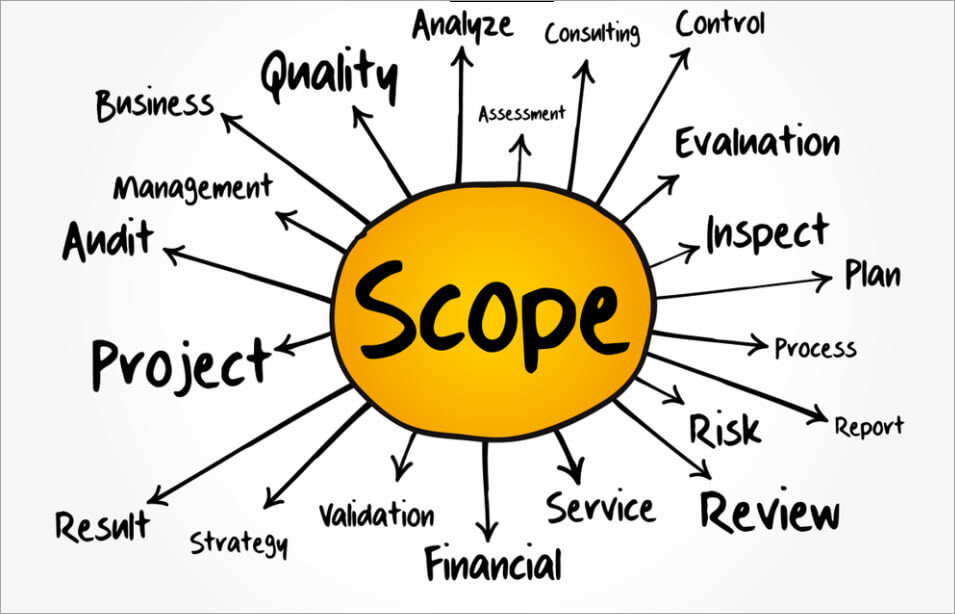Jump ahead to
Introduction to Scope Management Plan:
The scope of the project is the most important component of a project. It can make or break the project. Project Managers define the size of a project and control it by keeping track of the project scope. Every project is bound to face certain obstacles like delays, exceeding budgets, untimely requests, and many more. Thus, it is the project manager’s responsibility to ensure that these obstacles do not affect the project scope.
Without scope management, organizations face the risk of scope creep, which may lead to project delay or failure. When project management professionals do not adequately define the scope of a project, project-related tasks cannot be handled easily. As a result, it is necessary to have a proper scope management plan in place. Organizations hiring Project Management Professionals to manage their projects are well versed in creating a scope management plan through the PMP Exam Prep course, which helps achieve the desired project success rate.
What is scope management?
Scope management while handling projects refers to a set of processes that ensure that the scope of a project is clearly defined and communicated to all the stakeholders. A scope management plan is prepared in the planning phase of a project to define the project scope. Project professionals must ensure that team members understand the project scope before executing the project.
What is the project scope?
Project scope defines the collection of deliverables that clients require. The client’s requirements must be fulfilled to deliver a product or service to clients successfully. However, a project’s scope can go through several changes before the project is provided, as clients tend to change their requirements due to various factors.
What is a scope management plan?
Similar to the project plan, a scope management plan refers to a set of processes undertaken to include all the tasks necessary for successfully completing a project. The program assists project management professionals in finishing projects within the schedule, budget, and allocated resources. In the modern era, it is common to modify the results to be delivered to clients. Certified project professionals use scope management plan to document the tasks, deadlines, end results, and costs allocated for such tasks. Let us have an in-depth look at these elements.
The major components of a scope management plan are as follows:
- Adequately defined requirements:
The first step in creating a scope management plan is to list clients’ requirements. Project Management Professionals conduct endless meetings with clients to determine their requirements using various available tools.
- Draw a scope statement:
The most important step of the project plan is to have a scope statement. This statement describes deliverables, constraints, assumptions, and other elements required per the project.
- Stakeholders:
In this component, project professionals list the names of stakeholders who have a major influence in making changes to the requirements specified for the project. This list helps project managers make changes to scope unnecessarily and reduces the chances of scope creep.
- Work Breakdown Structure (WBS):
To effectively manage the scope management plan, it is necessary to include WBS. Elements that can be included within WBS are deadline, start date, duration, budget, predecessor activities, and the resources required. This list can vary depending on the intensity of the project.
- Deliverables:
A deliverable is the end product that is delivered to clients upon completion of the project. The scope management plan shall include the list of deliverables to be given to clients along with the specifications and standards they should meet.
- Evaluation of scope:
Project management professionals need to devise tools and techniques to evaluate whether the deliverables are according to what was defined in the scope statement. In case of deviations, project professionals must take necessary action at the earliest to avoid project delays.
- Stakeholder acceptance:
The deliverables offered to clients on project completion are not the end of the process. Stakeholders are required to approve the product on delivery. Only then can the project be closed successfully.
- Scope control:
This component helps track whether the project is being carried out per the scope management plan. This element specifies how to handle change requests for project management professionals without changing the course of the project.
- Role of project professionals:
This component describes who shall have the authority to manage scope. It is usually the responsibility of project management professionals to specify the duties of project sponsors and team leaders within this component.
These components can vary according to the intensity of the project. Complex projects have a more tedious process of determining the features that must be included in the scope management. Project Managers plan the scope management process by following the abovementioned elements for successful project delivery. With a defined project scope and a plan for scope management, project managers can meet the deadlines and stay on track throughout the project life cycle.
Why is a scope management plan important?
Project management professionals master the art of managing stakeholders and their requirements. However, ordering them without a proper scope management plan can be challenging. This plan helps managers to clearly define the project scope and incorporate only those changes that do not disrupt the functioning of the project. A scope management plan also helps stay on track by meeting all the deadlines stated in the project scope, thereby successfully increasing the project success rate.
Conclusion
Project management professionals (PMPs) gain an in-depth understanding of scope management plans while undergoing PMP Certification Training. With the help of this PMP exam training, aspiring project managers and PMPs can learn about the scope management plan in detail. After completing this training, these professionals can successfully define the scope process and attempt the PMP scope management questions appearing in the PMP certification examination. Thus, along with a thorough understanding of the scope management plan, PMP certification aspirants can also attain their organizations’ objectives. Highly qualified trainers engage in introducing real-life scenarios, which helps such professionals to be industry-ready and implement the latest practices of scope management while handling projects.
Summary
A Scope Management Plan is crucial for project success, serving as a formal document that defines and controls what is and what is not included in the project deliverables and work. Developed during the planning phase, it details how the scope statement, requirements, and Work Breakdown Structure (WBS) will be created, managed, and verified. Its core importance lies in preventing scope creep uncontrolled changes that can derail budget and schedule.
FAQs on Scope Management Plan
1. What is the main purpose of a Scope Management Plan?
To clearly define, control, and communicate the project’s scope, ensuring all work performed is necessary to deliver the agreed-upon product.
2. What is scope creep in project management?
Scope creep is the uncontrolled expansion of a project’s scope after it has begun, often caused by poor change control or unclear requirements.
3. What are the key components of a Scope Management Plan?
It includes the plan for defining the scope, creating the WBS, validating the scope, and controlling any changes to the scope.
4. What is a Work Breakdown Structure (WBS)?
The WBS is a deliverable-oriented, hierarchical decomposition of the total scope of work to be executed by the project team.
5. How do you prevent scope creep in a project?
Prevention involves clearly defining project boundaries, having a robust change control system, and ensuring stakeholder sign-off on the scope statement.
6. What is the Project Scope Statement?
This document formally describes the project’s deliverables, objectives, boundaries, constraints, and assumptions for all stakeholders.
7. Which project phase is Scope Management Plan created in?
The Scope Management Plan is created during the Planning phase of the project lifecycle.
8. What does “validate scope” mean?
Validate scope is the process of formalizing acceptance of the completed project deliverables by the key stakeholders.
9. What is the role of the PMP certification in scope management?
PMP training provides project managers with the standardized processes and techniques necessary to effectively manage and control project scope.
10. What are the “deliverables” in project management scope?
Deliverables are the unique, verifiable products, results, or capabilities that must be produced to complete the project successfully.




